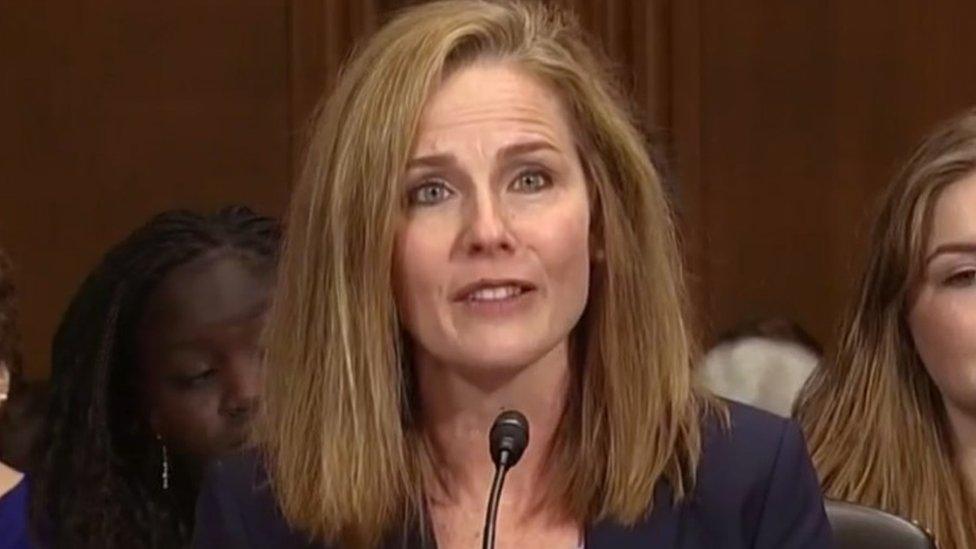Will Amy Coney Barrett be Trump's Supreme Court pick?
- Published

Amy Coney Barrrett
One of the names on Donald Trump's Supreme Court shortlist is a 46-year-old appellate court judge, former law professor and mother of seven.
She could also end up being a political lightning rod in the biggest confirmation battle of modern US history.
President Trump has said he will reveal his nominee to replace Justice Anthony Kennedy, who announced his retirement from the US Supreme Court, to the American public on Monday.
That marks a remarkably fast turnaround for filling a court vacancy. Part of the reason Mr Trump can move so quickly is that he already has a list of names to draw from - a list first compiled during his general election campaign in 2016 and supplemented in the nearly two years since.
They are all conservative-approved candidates, selected with the help of right-wing groups like the Heritage Foundation and the Federalist Society. There's one name on the list who is garnering particular attention, however - someone who is reportedly one of four finalists who have already met with Mr Trump in the White House.
Her name is Amy Coney Barrett.
The former Notre Dame law professor and clerk to the late Justice Antonin Scalia, a conservative icon, went from relative anonymity to a favourite of the evangelical right when Mr Trump nominated her to the Seventh Circuit US Court of Appeals.
During a contentious confirmation hearing, Democratic Senator Dianne Feinstein suggested the writings of Ms Barrett - who is a devout Catholic - might indicate she could not be impartial when religious issues appear before her court.
Conservatives - and some liberals - objected to what they said was a "religious test" being applied to torpedo a judicial nominee.
Fear or opportunity? Liberals and conservatives on what's next for the US Supreme Court
The 46-year-old mother of seven ticks a number of boxes for Mr Trump's Supreme Court justice search.
She has established conservative credentials - from her academic writings, if not from a long judicial case record - and she is young and telegenic. She also garnered support from some moderate Democratic senators when she was confirmed 55-43 to the appellate court last October.
Mr Trump has expressed an interest in nominating a woman to the bench, which could be advantageous if - as liberals fear and evangelicals hope - the new nominee helps the court either reverse or greatly undercut judicial protections for legalised abortion in the coming years.
Already one top Democrat is focusing his rhetorical fire on Ms Barrett by name - something party leaders have yet to do for any of the other candidates on Mr Trump's short list.
Senate Minority Leader Chuck Schumer that she could be an "activist judge" who would ignore court precedent and jeopardise abortion rights and government healthcare programmes.
Meanwhile, conservatives appear to be rallying around her. Phillip Jauregui, president of the Judicial Action Group, writes that all 25 people on Mr Trump's Supreme Court candidate list, and Ms Barrett was the name all "conservative constitutionalists" should support.
"Barrett understands the value of every life, and her view aligns with constitutional principles," he writes. "She also has shown the courage to maintain these principles once on the Supreme Court."
After several disappointing nominations to the court by past Republican presidents - Mr Kennedy was a Ronald Reagan appointee, for instance - conservative consistency is a much-sought-after quality for the next court justice.
Jauregui, and other conservatives, appear to have faith that Ms Barrett will keep the faith.